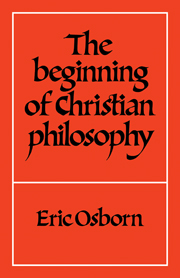Book contents
- Frontmatter
- Contents
- PREFACE
- REFERENCES
- ABBREVIATIONS
- 1 CHRISTIAN ARGUMENT
- 2 PEOPLE AND PLACES
- 3 THE GOD ABOVE
- 4 THE RATIONAL LAUGHING ANIMAL
- 5 COSMOS AND CREATION
- 6 HISTORY
- 7 THE SHORT WORD
- CONCLUSION
- APPENDIX
- BIBLIOGRAPHY
- INDEX OF BIBLICAL CITATIONS
- INDEX OF CITATIONS FROM ANCIENT AUTHORS
- INDEX OF CITATIONS FROM MODERN AUTHORS
- GENERAL INDEX
4 - THE RATIONAL LAUGHING ANIMAL
Published online by Cambridge University Press: 18 February 2010
- Frontmatter
- Contents
- PREFACE
- REFERENCES
- ABBREVIATIONS
- 1 CHRISTIAN ARGUMENT
- 2 PEOPLE AND PLACES
- 3 THE GOD ABOVE
- 4 THE RATIONAL LAUGHING ANIMAL
- 5 COSMOS AND CREATION
- 6 HISTORY
- 7 THE SHORT WORD
- CONCLUSION
- APPENDIX
- BIBLIOGRAPHY
- INDEX OF BIBLICAL CITATIONS
- INDEX OF CITATIONS FROM ANCIENT AUTHORS
- INDEX OF CITATIONS FROM MODERN AUTHORS
- GENERAL INDEX
Summary
After Socrates, Greek philosophy could never turn its back on questions about man and the life he should live. Man became the centre of the cosmos, ethics became fundamental and introspective reflection like that of Marcus Aurelius emerged. Philosophers and Gnostics asked: ‘Where did man come from and how did he come?’ Christian thinkers had to ask about man for other reasons too. They saw a new humanity in Christ, a universal brotherhood, which broke across every barrier of race and class. The goal of history was the liberty of the children of God, a liberty shown in Christ and given to his followers. If man were central to the total purpose of things, as the Stoics also insisted he was, what was he? Further, if man's salvation were the goal of Christian preaching and of more esoteric religious propaganda, why did man need to be saved? Again, Christians claimed as evidence for the truth of their God, the moral transformation of men of all shapes and sizes; this confident but perilous claim kept man in the centre of the argument. Finally, there was only one ground on which all the critics of Christianity could be met: polytheist, philosopher, Jew, Gnostic, Marcionite, with internal divergences in most camps, had nothing but their humanity in common. When the apologists spoke as men to men, they were dealing with the only common question.
Man, according to one definition that Clement found, was a rational, mortal, earthy, walking, laughing animal.
- Type
- Chapter
- Information
- The Beginning of Christian Philosophy , pp. 79 - 123Publisher: Cambridge University PressPrint publication year: 1981



